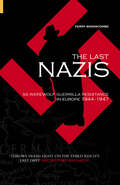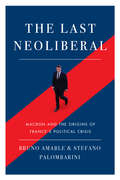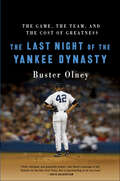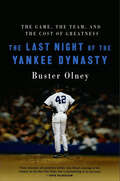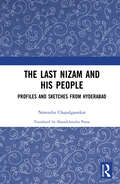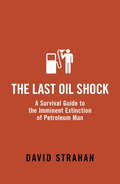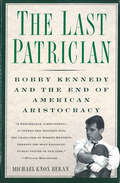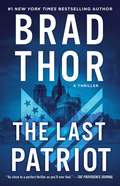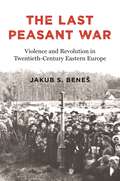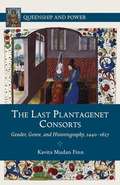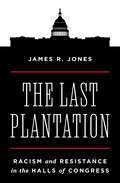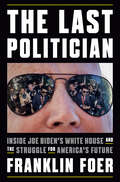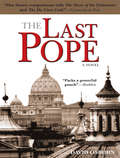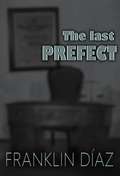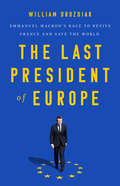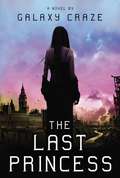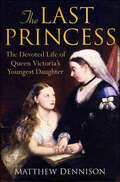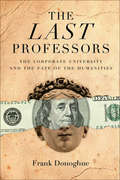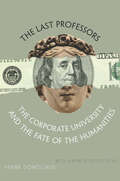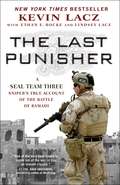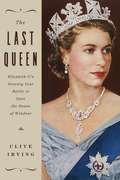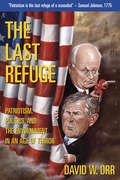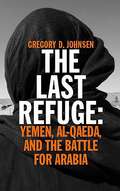- Table View
- List View
The Last Nazis: SS Werewolf Guerrilla Resistance in Europe 1944-1947
by Perry BiddiscombeThe history of the shadowy Werewolf guerrilla bands formed at end of the Second World War as the last desperate defence of Nazis.Founded by Heinrich Himmler in 1944 when it became clear Germany would be invaded, the Werewolf guerrilla movement was given the task of slowing down the Allied advance to allow time for the success of negotiations or wonder weapons. Staying behind in territory occupied by the Allies, its mission was to carry out acts of sabotage, arson and assassination, both of enemy troops and of defeatist Germans.Perry Biddiscombe has researched the movement exhaustively, and details Werewolf operations against the British, Russians and fellow Germans, on the Eastern and Western Fronts and in the post-war chaos of Berlin. Giving the lie to the established story of a cowed German population meekly submitting to defeat, this is a fascinating insight into what has been described as the death scream of the Nazi regime.
The Last Neoliberal: Macron and the Origins of France's Political Crisis
by Bruno Amable Stefano PalombarinWhy centrist politics in France is bound to failThis book analyses the French political crisis, which has entered its most acute phase in more than thirty years with the break-up of traditional left and right social blocs. Governing parties have distanced themselves from the working classes, leaving behind on the one hand, craftsmen, shop owners and small entrepreneurs disappointed by the timidity of the reforms of the neoliberal right and, on the other hand, workers and employees hostile to the neoliberal and pro-European integration orientation of the Socialist Party. The Presidency of François Hollande was less an anomaly than the definitive failure of attempts to reconcile the social base of the left with the so-called "modernisation" of the French model. The project, based on the pursuit of neoliberal reforms, did not die with Hollande's failure; it was taken up and radicalised by his successor, Emmanuel Macron. This project needs a social base, the 'bourgeois bloc", designed to overcome the right/left divide by a new alliance between the middle and upper classes. But this, as we have seen recently on the streets of Paris and elsewhere, is a precarious process.
The Last Night of the Yankee Dynasty: The Game, the Team, and the Cost of Greatness
by Buster OlneyFor six extraordinary years around the turn of the millennium, the Yankees were baseball's unstoppable force, with players such as Paul O'Neill, Derek Jeter, and Mariano Rivera. But for the players and the coaches, baseball Yankees-style was also an almost unbearable pressure cooker of anxiety, expectation, and infighting. With owner George Steinbrenner at the controls, the Yankees money machine spun out of control. In this new edition of The Last Night of the Yankee Dynasty, Buster Olney tracks the Yankees through these exciting and tumultuous seasons, updating his insightful portrait with a new introduction that walks readers through Steinbrenner's departure from power, Joe Torre's departure from the team, the continued failure of the Yankees to succeed in the postseason, and the rise of Hank Steinbrenner. With an insider's familiarity with the game, Olney reveals what may have been an inevitable fall that last night of the Yankee dynasty, and its powerful aftermath.
The Last Night of the Yankee Dynasty: The Game, the Team, and the Cost of Greatness
by Buster OlneyFor six extraordinary years around the turn of the millennium, the Yankees were baseball's unstoppable force, with players such as Paul O'Neill, Derek Jeter, and Mariano Rivera. But for the players and the coaches, baseball Yankees-style was also an almost unbearable pressure cooker of anxiety, expectation, and infighting. With owner George Steinbrenner at the controls, the Yankees money machine spun out of control. In this new edition of The Last Night of the Yankee Dynasty, Buster Olney tracks the Yankees through these exciting and tumultuous seasons, updating his insightful portrait with a new introduction that walks readers through Steinbrenner's departure from power, Joe Torre's departure from the team, the continued failure of the Yankees to succeed in the postseason, and the rise of Hank Steinbrenner. With an insider's familiarity with the game, Olney reveals what may have been an inevitable fall that last night of the Yankee dynasty, and its powerful aftermath.
The Last Nizam and His People: Profiles and Sketches from Hyderabad
by Narendra ChapalgaonkarAs a Princely State, Hyderabad was the largest in population among over 560 tributary states under British paramountcy in colonial India. This book is a collection of profiles and sketches of some of the most important and influential people from the erstwhile Hyderabad State during the first half of the 20th century, which marked the last decades of its existence as a distinct entity under the British Raj. It features profiles of Mir Osman Ali Khan, the Seventh Nizam; Mir Laik Ali, the last Prime Minister of Hyderabad; Kasim Razvi; some of the Nizam’s administrators and diplomats; as well as Sir Walter Monckton, the Nizam’s British Constitutional Advisor; amongst others. Unfolding the pages of history, the text gives an insight into the administration and affairs of Hyderabad during this time, through an examination of the lives of the people closely associated with it. A unique contribution to the literature on modern Indian and colonial history, this book will be indispensable for students and researchers of history, modern Indian history, colonialism, imperial history, biography, and South Asia studies. It will also appeal to general readers interested in the history of Hyderabad.
The Last Oil Shock: A Survival Guide to the Imminent Extinction of Petroleum Man
by David StrahanThis may be the most important book you or anyone else will read in the next fifty years. Assuming humanity survives that long. Draining the lifeblood of industrial civilization, the terminal decline of oil and gas production will spark a crisis far more dangerous than international terrorism, and more urgent than climate change. World leaders know it, so why aren't they telling? The last oil shock is the secret behind the crises in Iraq and Iran, the reason your gas bill is going through the roof, the basis of a secret deal cooked up in Texas between George Bush and Tony Blair, the cause of an imminent and unprecedented economic collapse, and the reason you may soon be kissing your car keys and boarding pass goodbye. David Strahan explains how we reached this critical state, how the silence of governments, oil companies and environmentalists conspires to keep the public in the dark, what it means for energy policy, and what you can do to protect yourself and your family from the ravages of the last oil shock.
The Last Oil Shock: A Survival Guide to the Imminent Extinction of Petroleum Man
by David StrahanThis may be the most important book you or anyone else will read in the next fifty years. Assuming humanity survives that long. Draining the lifeblood of industrial civilization, the terminal decline of oil and gas production will spark a crisis far more dangerous than international terrorism, and more urgent than climate change. World leaders know it, so why aren't they telling? The last oil shock is the secret behind the crises in Iraq and Iran, the reason your gas bill is going through the roof, the basis of a secret deal cooked up in Texas between George Bush and Tony Blair, the cause of an imminent and unprecedented economic collapse, and the reason you may soon be kissing your car keys and boarding pass goodbye. David Strahan explains how we reached this critical state, how the silence of governments, oil companies and environmentalists conspires to keep the public in the dark, what it means for energy policy, and what you can do to protect yourself and your family from the ravages of the last oil shock.
The Last Patrician: Bobby Kennedy and the End of American Aristocracy
by Michael Knox BeranOverviewIn this provocative reassessment of one of the most controversial figures of twentieth-century American politics, Michael Knox Beran shows how Bobby Kennedy was shaped by values of the aristocratic class to which he had been brought up to belong. He was one of them - until he realized that the welfare state they had helped to create at home and the empire they had helped to found abroad were undermining some of America's most cherished traditions. In denouncing the welfare system as a "second-rate set of social services" and "hand-outs," and in questioning the imperial commitments that the patricians made in places like Vietnam, Bobby Kennedy was a prophet who accurately foresaw the changing direction of American politics. Challenging the work of Arthur Schlesinger Jr., Jack Newfield, and others, Beran demonstrates that Bobby was neither a pious liberal martyr nor a would-be revolutionary. He was a man who drew on the wisdom of Emerson, the ancient Greeks, and his own father's ideas about the transformative power of free markets - and used them to create a compelling vision of a better America.
The Last Patriot: A Thriller (The Scot Harvath Series #7)
by Brad ThorBrad Thor, master of suspense and #1 New York Times bestselling author is back with his highest-voltage thriller to date in which Navy SEAL turned covert Homeland Security operative Scot Harvath must race to locate an ancient secret that has the power to stop militant Islam dead in its tracks.June 632 A.D.: Deep within the Uranah Valley of Mount Arafat in Mecca, the Prophet Mohammed shares with his closest companions a final and startling revelation. Within days, he is assassinated. September 1789: U.S. Minister to France Thomas Jefferson, who is charged with forging a truce with the violent Muslim pirates of the Barbary Coast, makes a shocking discovery—one that could forever impact the world’s relationship with Islam. Present day: When a car bomb explodes outside a Parisian café, Scot Harvath is thrust back into the life he has tried so desperately to leave behind. Saving the intended victim of the attack, Harvath becomes party to a perilous race to uncover a secret so powerful that militant Islam could be defeated once and for all. But as desperate as the American government is to have the information brought to light, there are powerful forces determined that Mohammed’s mysterious final revelation continue to remain hidden forever. What Jason Bourne was to the Cold War, Scot Harvath is to the War on Terror. In The Last Patriot, readers will be engrossed as Harvath once again takes them on a whirlwind tour through international cities and nail-biting suspense where the stakes are higher than they have ever been before.
The Last Peasant War: Violence and Revolution in Twentieth-Century Eastern Europe
by Jakub S. BenešA history of the largely forgotten peasant revolution that swept central and eastern Europe after World War I—and how it changed the course of interwar politics and World War IIAs the First World War ended, villages across central and eastern Europe rose in revolt. Led in many places by a shadowy movement of army deserters, peasants attacked those whom they blamed for wartime abuses and long years of exploitation—large estate owners, officials, and merchants, who were often Jewish. At the same time, peasants tried to realize their rural visions of a reborn society, establishing local self-government or attempting to influence the new states that were being built atop the wreckage of the Austro-Hungarian and Russian Empires. In The Last Peasant War, Jakub Beneš presents the first comprehensive history of this dramatic and largely forgotten revolution and traces its impact on interwar politics and the course of the Second World War.Sweeping large portions of the countryside between the Alps and the Urals from 1917 to 1921, this peasant revolution had momentous aftereffects, especially among Slavic peoples in the former lands of the Austro-Hungarian Empire. It enabled an unprecedented expansion of agrarian politics in the interwar period and provided a script for rural resistance that was later revived to resist Nazi occupation and to challenge Communist rule in east central Europe.By shifting historical focus from well-studied cities to the often-neglected countryside, The Last Peasant War reveals how the movements and ambitions of peasant villagers profoundly shaped Europe&’s most calamitous decades.
The Last Plantagenet Consorts
by Kavita Mudan FinnAn examination of fifteenth-century British queens through literature and history.
The Last Plantation: Racism and Resistance in the Halls of Congress
by James R. JonesA revealing look at the covert and institutionalized racism lurking in the congressional workplaceRacism continues to infuse Congress&’s daily practice of lawmaking and shape who obtains congressional employment. In this timely and provocative book, James Jones reveals how and why many who work in Congress call it the &“Last Plantation.&” He shows that even as the civil rights movement gained momentum in the 1960s and antidiscrimination laws were implemented across the nation, Congress remained exempt from federal workplace protections for decades. These exemptions institutionalized inequality in the congressional workplace well into the twenty-first century.Combining groundbreaking research and compelling firsthand accounts from scores of congressional staffers, Jones uncovers the hidden dynamics of power, privilege, and resistance in Congress. He reveals how failures of racial representation among congressional staffers reverberate throughout the American political system and demonstrates how the absence of diverse perspectives hampers the creation of just legislation. Centering the experiences of Black workers within this complex landscape, he provides valuable insights into the problems they face, the barriers that hinder their progress, and the ways they contest entrenched inequality.A must-read for anyone concerned about social justice and the future of our democracy, The Last Plantation exposes the mechanisms that perpetuate racial inequality in the halls of Congress and challenges us to confront and transform this unequal workplace that shapes our politics and society.
The Last Politician: Inside Joe Biden's White House and the Struggle for America's Future
by Franklin FoerThe New York Times bestsellerFranklin Foer tells the definitive insider story of the first two years of the Biden presidency, with exclusive access to Biden&’s longtime team of advisers, and presents a gripping portrait of a president during this momentous time in our nation&’s history."You might love Biden or you might hate Biden, but either way, if you want to understand him, you will want to buy this book." —Politico&“A triumph of reporting.&” — Geoff Bennett, PBS NewsHour &“Deeply reported . . . a terrific read.&” —Chuck Todd, Meet the Press&“Fantastic . . . The first real insider account of the Biden White House and a fascinating read about Biden himself.&” —Jon Favreau, Pod Save AmericaOn January 20, 2021, standing where only two weeks earlier police officers had battled with right-wing paramilitaries, Joe Biden took his oath of office. The American people were still sick with COVID-19, his economists were already warning him of an imminent financial crisis, and his party, the Democrats, had the barest of majorities in the Senate. Yet, faced with an unprecedented set of crises, Joe Biden decided he would not play defense. Instead, he set out to transform the nation. With unparalleled access to the tight inner circle of advisers who have surrounded Biden for decades, Franklin Foer dramatizes in forensic detail the first two years of the Biden presidency, concluding with the historic midterm elections. The result is a gripping and high-definition portrait of a major president at a time when democracy itself seems imperiled.The Last Politician is a landmark work of political reporting—which includes thrilling, blow-by-blow insider reports of the botched withdrawal from Afghanistan and the White House&’s swift response to the Russian invasion of Ukraine—that is destined to shape history&’s view of a president in the eye of the storm.
The Last Pope
by David OsbornIn the tradition of the classic bestseller The Shoes of the Fisherman, this evocative and moving novel takes you deep inside the inner world of the Vatican and the American branch of the Holy See to dramatize the great moral issues dividing the Church. The passing of humble and beloved Pope Gregory XVIII brings the Lords of the Church to the Basilica of St. Peter in Rome to meet in its secret recesses and elect a new pope. They find they must choose between a caring, but guilt-ridden, American cardinal (the very same young priest who made a heart-rending confession so many years ago) who would bring reforms to the Church, or a cardinal whose soul belongs to the Inquisition. At stake is the future of the Church itself.
The Last Post-Cold War Socialist Federation: Ethnicity, Ideology and Democracy in Ethiopia (Federalism Studies)
by Semahagn Gashu AbebeAfter the fall of the Berlin wall and the disintegration of the former USSR and Yugoslavia, it has widely been assumed that socialist federations have become a thing of the past. Ethiopia’s ethnic federal system however is essentially a socialist federal system based on the notion of the ’right to self-determination of nationalities’ and a Marxist-Leninist organization of the state and party. This book assesses the Ethiopian ethnic federal system from the perspective of the principles of socialist federations and other Marxist oriented policies pursued by the ruling Ethiopian Peoples' Revolutionary Democratic Front (EPRDF). Exploring how the application of these ideological principles has impacted on the structure and function of the Ethiopian federal system, the research examines the ways in which these ideological policies of the ruling party affect national consensus, protection of human rights, the rights of minority groups, separation of power principles and the relationship between the federal and regional governments. It also explores the extent to which ideological principles have had an impact on the democratization process, rule of law and in building up institutions such as parliamentary democracy, the judiciary, the media and civil society organizations in the country. Approaching the Ethiopian federal system from the perspective of the fundamental ideological principles of the party in power allows a deeper insight into the structure and function of the ethnic federal system.
The Last Prefect
by Franklin A. Díaz LárezOn 31 December 2001, Venezuela’s prefectures were finally abolished. The prefectures were institutions regulated by a law that was unconstitutional, unjust and immoral: the vagrancy law. This was a legal framework which authorised prefects to arrest and detain people for up to seventy-two hours, or have them interned indefinitely and without sentencing in abhorrent prison camps. This law had been inherited from Venezuela’s last dictatorship, that of General Marcos Pérez Jiménez, which had copied it, almost to the letter, from another enforced in Spain under the dictatorship of Franco. Under its terms, anyone with no known occupation could be considered a vagrant, and so be subject to sanction by the prefects. Homosexuals were also placed in this category. Inexplicably, even though the judicial and ethical underpinnings of the law bordered on the absurd, it remained in full force, and the civil servants working within its remit had no authority to refuse to enforce it. As long as it remained in operation, prefects were required to respect it, comply with it, and ensure the public’s compliance. As luck – or misfortune – would have it, I was one of the last of those prefects. These are my memories of some of the most surprising cases I had to contend with.
The Last President of Europe: Emmanuel Macron's Race to Revive France and Save the World
by William DrozdiakA revelatory examination of the global impact of Emmanuel Macron's tumultuous presidency.A political novice leading a brand new party, in 2017 Emmanuel Macron swept away traditional political forces and emerged as president of France. Almost immediately he realized his task was not only to modernize his country but to save the EU and a crumbling international order. From the decline of NATO, to Russian interference, to the Gilets Jaunes (Yellow Vest) protestors, Macron's term unfolded against a backdrop of social conflict, clashing ambitions, and resurgent big-power rivalries.In The Last President of Europe, William Drozdiak tells with exclusive inside access the story of Macron's presidency and the political challenges the French leader continues to face. Macron has ridden a wild rollercoaster of success and failure: he has a unique relationship with Donald Trump, a close-up view of the decline of Angela Merkel, and is both the greatest beneficiary from, and victim of, the chaos of Brexit across the Channel. He is fighting his own populist insurrection in France at the same time as he is trying to defend a system of values that once represented the West but is now under assault from all sides. Together these challenges make Macron the most consequential French leader of modern times, and perhaps the last true champion of the European ideal.
The Last Princess
by Galaxy CrazeHappily ever after is a thing of the past.A series of natural disasters has decimated the earth. Cut off from the rest of the world, England is a dark place. The sun rarely shines, food is scarce, and groups of criminals roam the woods, searching for prey. The people are growing restless.When a ruthless revolutionary sets out to overthrow the crown, he makes the royal family his first target. Blood is shed in Buckingham Palace, and only sixteen-year old Princess Eliza manages to escape. Determined to kill the man who destroyed her family, Eliza joins the enemy forces in disguise. She has nothing left to live for but revenge, until she meets someone who helps her remember how to hope-and love-once more.Now she must risk everything to ensure that she does not become . . .The Last Princess.
The Last Princess: The Devoted Life of Queen Victoria's Youngest Daughter
by Matthew DennisonAn engrossing biography of Queen Victoria's youngest daughter that focuses on her relationship with her willful mother--a powerful and insightful look into two women of significant importance and influence in world history.Beatrice was the last child born to Queen Victoria and Prince Albert. Her father died when she was four and Victoria came to depend on her youngest daughter absolutely, and also demanded from her complete submission. Victoria was not above laying it down regally even with her own children. Beatrice succumbed to her mother's obsessive love, so that by the time she was in her late teens she was her constant companion and running her mother's office, which meant that when Victoria died her daughter became literary executor, a role she conducted with Teutonic thoroughness. And although Victoria tried to prevent Beatrice even so much as thinking of love, her guard slipped when Beatrice met Prince Henry of Battenberg. Sadly, Beatrice inherited from her mother the hemophilia gene, which she passed on to two of her four sons and which her daughter Victoria Eugenia, in marrying Alfonso XIII of Spain, in turn passed on to the Spanish royal family. This new examination will restore her to her proper prominence--as Queen Victoria's second consort.
The Last Professors: The Corporate University and the Fate of the Humanities
by Frank Donoghue“What makes the modern university different from any other corporation?” asked Columbia’s Andrew Delbanco recently in the New York Times. “There is more and more reason to think: less and less,” he answered. In this provocative book, Frank Donoghue shows how this growing corporate culture of higher education threatens its most fundamental values by erasing one of its defining features: the tenured professor. Taking a clear-eyed look at American higher education over the last twenty years, Donoghue outlines a web of forces—social, political, and institutional—dismantling the professoriate. Today, fewer than 30 percent of college and university teachers are tenured or on tenure tracks, and signs point to a future where professors will disappear. Why? What will universities look like without professors? Who will teach? Why should it matter? The fate of the professor, Donoghue shows, has always been tied to that of the liberal arts —with the humanities at its core. The rise to prominence of the American university has been defined by the strength of the humanities and by the central role of the autonomous, tenured professor who can be both scholar and teacher. Yet in today’s market-driven, rank- and ratings-obsessed world of higher education, corporate logic prevails: faculties are to be managed for optimal efficiency, productivity, and competitive advantage; casual armies of adjuncts and graduate students now fill the demand for teachers. Bypassing the distractions of the culture wars and other “crises,” Donoghue sheds light on the structural changes in higher education—the rise of community colleges and for-profit universities, the frenzied pursuit of prestige everywhere, the brutally competitive realities facing new Ph.D.s —that threaten the survival of professors as we’ve known them. There are no quick fixes in The Last Professors; rather, Donoghue offers his fellow teachers and scholars an essential field guide to making their way in a world that no longer has room for their dreams.
The Last Professors: The Corporate University and the Fate of the Humanities, With a New Introduction
by Frank Donoghue“What makes the modern university different from any other corporation?” asked Columbia’s Andrew Delbanco recently in the New York Times. “There is more and more reason to think: less and less,” he answered.In this provocative book, Frank Donoghue shows how this growing corporate culture of higher education threatens its most fundamental values by erasing one of its defining features: the tenured professor.Taking a clear-eyed look at American higher education over the last twenty years, Donoghue outlines a web of forces—social, political, and institutional—dismantling the professoriate. Today, fewer than 30 percent of college and university teachers are tenured or on tenure tracks, and signs point to a future where professors will disappear. Why? What will universities look like without professors? Who will teach? Why should it matter? The fate of the professor, Donoghue shows, has always been tied to that of the liberal arts —with thehumanities at its core. The rise to prominence of the American university has been defined by the strength of the humanities and by the central role of the autonomous, tenured professor who can be both scholar and teacher. Yet in today’s market-driven, rank- and ratings-obsessed world of higher education, corporate logic prevails: faculties are to be managed for optimal efficiency, productivity, and competitive advantage; casual armies of adjuncts and graduate students now fill the demand for teachers.Bypassing the distractions of the culture wars and other “crises,” Donoghue sheds light on the structural changes in higher education—the rise of community colleges and for-profit universities, the frenzied pursuit of prestige everywhere, the brutally competitive realities facing new Ph.D.s —that threaten the survival of professors as we’ve known them. There are no quick fixes in The Last Professors; rather, Donoghue offers his fellow teachers and scholarsan essential field guide to making their way in a world that no longer has room for their dreams.First published in 2008, "The Last Professors" have largely had its arguments borne out in the interim, as the percentage of courses taught by tenured professors continues to dwindle. This new edition includes a substantial Preface that elaborates on recent developments and offers tough but productive analysis that will be crucial for today's academics to heed.
The Last Punisher: A SEAL Team THREE Sniper's True Account of the Battle of Ramadi
by Kevin Lacz Ethan E. Rocke Lindsey Lacz&“One of the very best books to come out of the war in Iraq,&” (Lt. Col. Dave Grossman, bestselling author of On Killing), The Last Punisher is a gripping and intimate on-the-ground memoir from a Navy SEAL who was part of SEAL Team THREE with American Sniper Chris Kyle. Experience his deployment, from his first mission to his first kill to his eventual successful return to the United States to play himself in the Oscar-nominated film directed by Clint Eastwood and starring Bradley Cooper.The Last Punisher is a “thoughtful, funny, and raw…always compelling” (Bing West, New York Times bestselling author of No True Glory) first-person account of the Iraq War. With wry humor and moving testimony, Kevin Lacz tells the bold story of his tour in Iraq with SEAL Team THREE, the warrior elite of the Navy. This legendary unit, known as “The Punishers,” included Chris Kyle (American Sniper), Mike Monsoor, Ryan Job, and Marc Lee. These brave men were instrumental in securing the key locations in the pivotal 2006 Battle of Ramadi. Minute by minute, Lacz relays the edge-of-your-seat details of his team’s missions in Ramadi, offering a firsthand glimpse into the heated combat, extreme conditions, and harrowing experiences they faced every day. Through it all, Lacz and his teammates formed unbreakable bonds and never lost sight of the cause: protecting America with their fight. “A rare glimpse into the mind of a Navy SEAL,” (Clint Emerson, New York Times bestselling author of 100 Deadly Skills) Kevin Lacz brings you onto the battlefield and relays the tough realities of war. At the same time, Lacz shares how these experiences made him a better man and how proud he is of his contributions to one of this country’s most difficult military campaigns. The Last Punisher is the story of a SEAL and an “honest-to-God American hero” (Mike Huckabee, #1 bestselling author) who was never afraid to answer the call.
The Last Queen: Elizabeth II's Seventy Year Battle to Save the House of Windsor
by Clive IrvingA timely and revelatory new biography of Queen Elizabeth (and her family) exploring how the Windsors have evolved and thrived, as the modern world has changed around them. Clive Irving&’s stunning new narrative biography The Last Queen probes the question of the British monarchy&’s longevity. In 2021, the Queen Elizabeth II finally appears to be at ease in the modern world, helped by the new generation of Windsors. But through Irving&’s unique insight there emerges a more fragile institution, whose extraordinarily dutiful matriarch has managed to persevere with dignity, yet in doing so made a Faustian pact with the media. The Last Queen is not a conventional biography—and the book is therefore not limited by the traditions of that genre. Instead, it follows Elizabeth and her family&’s struggle to survive in the face of unprecedented changes in our attitudes towards the royal family, with the critical eye of an investigative reporter who is present and involved on a highly personal level.
The Last Refuge: Patriotism, Politics, and the Environment in an Age of Terror
by David W. Orr"Patriotism is the last refuge of scoundrels" -SAMUEL JOHNSON, 1775 "a tightly reasoned, excellently written book that should be lethally effective in helping readers who aren't experts understand the contours of the crisis." -TOLEDO BLADE Updated and revised following the 2004 elections, The Last Refuge describes the current state of American politics against the backdrop of mounting ecological and social problems, the corrosive influence of money, the corruption of language, and the misuse of terrorism as a political issue. Setting out an agenda that transcends conventional ideological labels, David Orr contends that partisan wrangling is only a symptom of a deeper dysfunction: The whole political machinery that connects Americans' fundamentally honorable ideals with public policy is broken. The book offers a withering critique of the failings of the Bush administration, supplemented by new essays that look at the national-level dominance of the Republican Party and examine the fallacy that the evangelical right represents a Christian majority. After analyzing the challenges of reforming the current system, Orr offers an empowering vision of a second American Revolution that peaceably achieves sustainability and charts a hopeful course for forward-looking citizens.
The Last Refuge: Yemen, al-Qaeda, and the Battle for Arabia
by Gregory D. Johnsen'Exhausted and on the run, it looked like the end for the small band of men. Looking at the few who had followed him into the desert, Muhammad said, "When disaster threatens, seek refuge in Yemen"... Yemen was the last refuge.' Far from the battlefields of Iraq and Afghanistan, in an unforgiving corner of Arabia, the US and al-Qaeda are fighting a clandestine war of drones and suicide bombers. The battles began in 2006, when twenty-three men tunnelled out of a maximum-security prison in Yemen's capital to their freedom. Later they were joined by a dozen men released from Guantánamo Bay. Together, they formed the core of al-Qaeda on the Arabian Peninsula - and now they and their recruits stand ready to hijack the Arab Spring, from the streets of Syria to hotspots much closer to home. In The Last Refuge, al-Qaeda scholar Gregory D. Johnsen charts the rise, the fall, and the ultimate resurrection of al-Qaeda in Yemen - given new life through a combustion of civil wars, Afghan refugees, and Muhammad's prophetic teachings. Johnsen brings us inside al-Qaeda's training camps and safe houses as the terrorists plot poison attacks and debate how to bring down a plane on Christmas Day. Based on years of on-the-ground interviews and never-before-translated al-Qaeda battle notes, he delivers a riveting and incisive investigation of the state of the Middle East.
